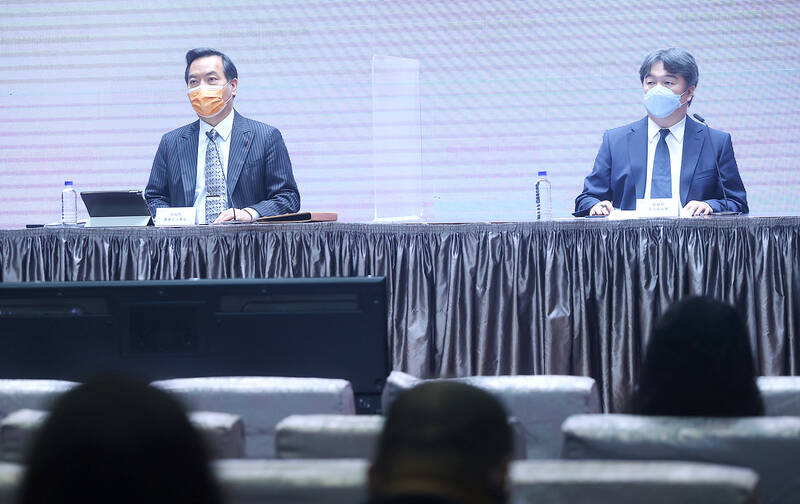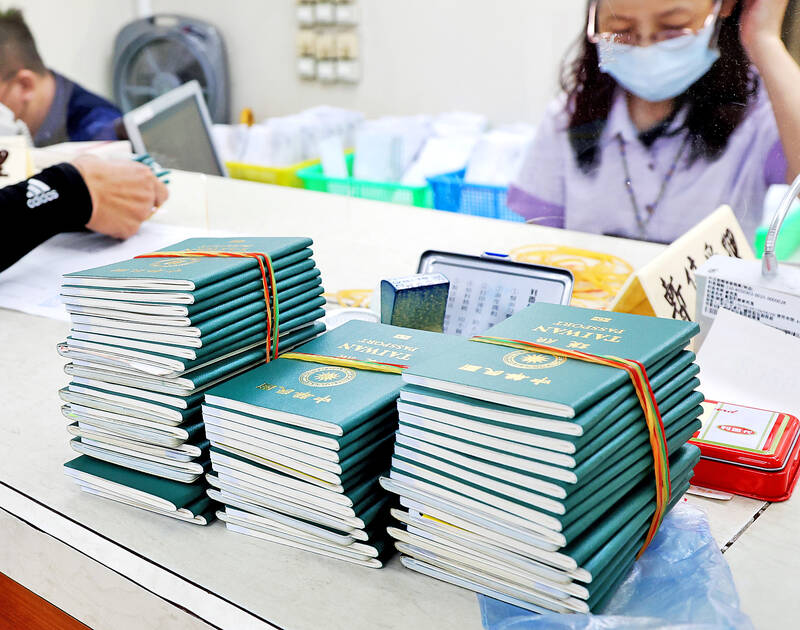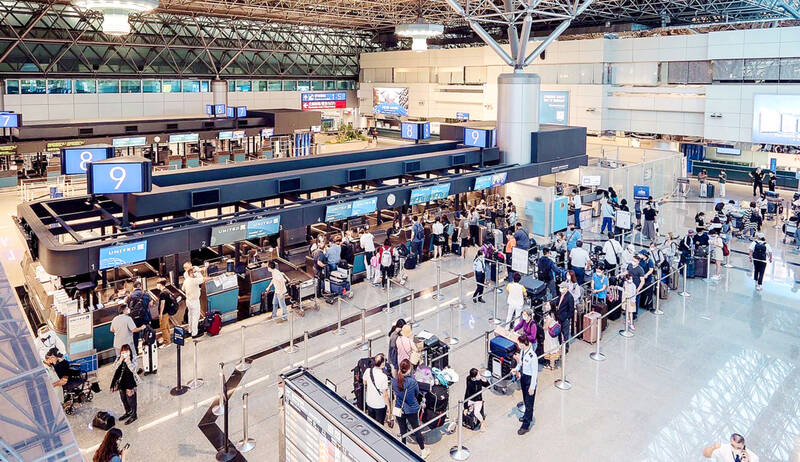Travelers arriving in Taiwan from Oct. 13 would no longer be required to quarantine on arrival and visitors of all nationalities would be allowed to enter, Premier Su Tseng-chang (蘇貞昌) announced yesterday.
However, the number of arrivals would be capped at 150,000 per week, he added.
Travelers aged two or older would be given four rapid antigen COVID-19 test kits on arrival and be asked to monitor their health for seven days, Cabinet spokesman Lo Ping-cheng (羅秉成) told a news conference.

Photo: CNA
Under the new arrival protocol, travelers would have to take a test on the day of arrival or the day after, followed by tests every two days during the seven-day period, Lo cited Su as telling a Cabinet meeting.
However, they would be allowed to go outside, he said.
If a visitor staying in a hotel tests positive during the seven-day period, they would have to relocate to a government-run quarantine center or a designated quarantine hotel, Lo said.

Photo: CNA
A ban on incoming and outgoing tour groups organized by travel agencies, which was imposed in March 2020, would also be lifted, the government said.
The decision to end the mandatory three-day quarantine for arrivals was made at yesterday’s Cabinet meeting, after Su visited Taiwan Taoyuan International Airport the previous day to inspect its readiness for the border opening, Lo said.
While the borders would reopen to all visitors, the number of arrivals would still be capped, as part of Taiwan’s COVID-19 control efforts, Lo said.

Photo courtesy of Taiwan Taoyuan International Airport via CNA
Ahead of the full opening, Taiwan yesterday raised the cap to 60,000 from 50,000 and eased some entry regulations.
Travelers are no longer required to take a polymerase chain reaction test on arrival, the Central Epidemic Command Center (CECC) said.
Arrivals can now quarantine at home even if they share it with others, as long as they stay in a separate room with an en suite bathroom, the center said.
From yesterday, travelers eligible for visa-free entry are allowed to enter, it said.
However, international arrivals before Oct. 13 would not be allowed to take the MRT from Taoyuan airport, but buses and fixed-price taxi services to destinations across Taiwan would remain available, the center said.
Free COVID-19 prevention buses run from the airport to Taichung, Yunlin County, Chiayi City, Chiayi County, Tainan, Kaohsiung, Pingtung County, New Taipei City and Taipei, as well as seven quarantine hotels in or near Taoyuan, it added.
Travelers may also be picked up by family members or friends at gates 11 through 15 at Terminal 1 and gates 31 through 33 at Terminal 2, the CECC said.
People traveling in groups, including students, business travelers and employees (including migrant workers), may arrange a vehicle to pick them up, it said.
People who parked their vehicle in designated airport lots before traveling abroad may drive to their quarantine location, it added.

NATIONAL SECURITY THREAT: An official said that Guan Guan’s comments had gone beyond the threshold of free speech, as she advocated for the destruction of the ROC China-born media influencer Guan Guan’s (關關) residency permit has been revoked for repeatedly posting pro-China content that threatens national security, the National Immigration Agency said yesterday. Guan Guan has said many controversial things in her videos posted to Douyin (抖音), including “the red flag will soon be painted all over Taiwan” and “Taiwan is an inseparable part of China,” while expressing hope for expedited “reunification.” The agency received multiple reports alleging that Guan Guan had advocated for armed reunification last year. After investigating, the agency last month issued a notice requiring her to appear and account for her actions. Guan Guan appeared as required,

DAREDEVIL: Honnold said it had always been a dream of his to climb Taipei 101, while a Netflix producer said the skyscraper was ‘a real icon of this country’ US climber Alex Honnold yesterday took on Taiwan’s tallest building, becoming the first person to scale Taipei 101 without a rope, harness or safety net. Hundreds of spectators gathered at the base of the 101-story skyscraper to watch Honnold, 40, embark on his daredevil feat, which was also broadcast live on Netflix. Dressed in a red T-shirt and yellow custom-made climbing shoes, Honnold swiftly moved up the southeast face of the glass and steel building. At one point, he stepped onto a platform midway up to wave down at fans and onlookers who were taking photos. People watching from inside

A Vietnamese migrant worker yesterday won NT$12 million (US$379,627) on a Lunar New Year scratch card in Kaohsiung as part of Taiwan Lottery Co’s (台灣彩券) “NT$12 Million Grand Fortune” (1200萬大吉利) game. The man was the first top-prize winner of the new game launched on Jan. 6 to mark the Lunar New Year. Three Vietnamese migrant workers visited a Taiwan Lottery shop on Xinyue Street in Kaohsiung’s Gangshan District (崗山), a store representative said. The player bought multiple tickets and, after winning nothing, held the final lottery ticket in one hand and rubbed the store’s statue of the Maitreya Buddha’s belly with the other,

‘NATO-PLUS’: ‘Our strategic partners in the Indo-Pacific are facing increasing aggression by the Chinese Communist Party,’ US Representative Rob Wittman said The US House of Representatives on Monday released its version of the Consolidated Appropriations Act, which includes US$1.15 billion to support security cooperation with Taiwan. The omnibus act, covering US$1.2 trillion of spending, allocates US$1 billion for the Taiwan Security Cooperation Initiative, as well as US$150 million for the replacement of defense articles and reimbursement of defense services provided to Taiwan. The fund allocations were based on the US National Defense Authorization Act for fiscal 2026 that was passed by the US Congress last month and authorized up to US$1 billion to the US Defense Security Cooperation Agency in support of the